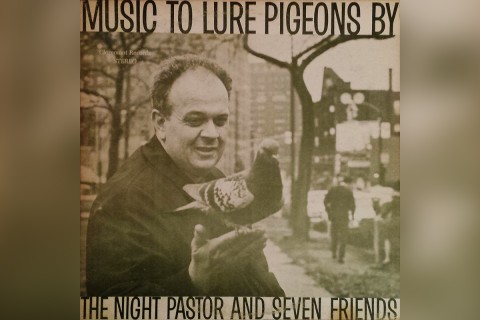The Night Pastor
I recently came across a record by 1960s Episcopal priest and jazz musician Robert Owen.

We were flipping through the records in the discount bin when we saw it: Music to Lure Pigeons By. The album cover was a black-and-white photo of a man, balding, with laugh lines. He’s looking, with half bemusement and half satisfaction, at a pigeon standing on his outstretched hand. Under the photo it told us that the 1967 record was by a band called the Night Pastor and Seven Friends. The $5 price tag was worth it for the album art alone, so it got added to the stack and came home with us.
My husband and I are big believers in the serendipity of the discount record bin. It was there we found And God Created Great Whales, Alan Hovhaness’s tone poem for orchestra and whale song; Passed This Way, an album of the best Bob Dylan covers we had ever heard, played by two young Servite monks in the 1960s; and an Andrés Segovia compilation with a photo on the cover of the classical guitarist playing the guitar, smoking a pipe, and holding a dachshund all at once. The Night Pastor turned out to be no exception.
Music to Lure Pigeons By is ten tracks of swingy, up-tempo Chicago jazz, as performed by Robert Owen, the Night Pastor himself. This is not just a cool name for a bandleader but an actual job title, held by Owen for several years as part of the Episcopal Diocese of Chicago. The Night Pastor’s job, as the back of the album informed us, was to “reach out into the night, ministering to the needs of the ‘Night People’—the ones who work—the ones who play—the ones who serve—the ones who are served.”




